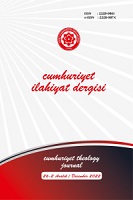Geç Osmanlı Döneminde Tefsir Tercümeleri: Tefsîr-i Mevâkib Üzerinden Bir Değerlendirme
Tafsir Translations in the Late Ottoman Period: An Evaluation on Tafsîr-i Mavâkib
Author(s): Gülnur KülünkoğluSubject(s): History of Islam, Translation Studies, Sociology of Religion, Qur’anic studies
Published by: Cumhuriyet Üniversitesi İlahyat Fakültesi
Keywords: Tafsir; Quran; Translation; Ottoman; Mavakib;
Summary/Abstract: Translated works have an important place in Ottoman studies. Among the translations made in this period is tafsir translations. In the literature review, it was determined that various studies were carried out on tafsir translations. The works have been examined from various aspects such as their sources, whether they rely on narrative reports or not, Qur'anic sciences, language, and stylistic features. In these studies, it has been observed that the context in which tafsir translations emerged was not sufficiently analyzed. Translated works emerge in a social, cultural, and political environment. It should not be overlooked that the tafsir translations that emerged in different periods of Ottoman history were not the product of the same conditions. The subject of this study is the tafsir translations that emerged in the late Ottoman period. It is seen that the interest in tafsir translations increased in this period. One of these works is Ismāʿīl Ferrūkh Efendī’s (d. 1840) Tafsīr al-Mawâkib which is a translation of Ḥusayn Vāʿiẓ Kāshifī’s (d. 1504-1505) Mawāhib al-'Aliyye. Tafsīr al-Mawâkib was first published in 1865. It discussed in the media in the following period. This study aims to determine in which social, cultural, and political context the tafsir translations emerged focusing on the example of Tafsīr al-mawâkib. To achieve this aim, the contextual analysis method was used. This method examines the effect of the social, political, and cultural context in which the texts emerged on the emergence of the texts. According to various studies, one reason for emergence of Tafsīr al-Mawâkib is that it was suitable for Ottoman society because the translated work i.e. the Mawāhib al-'Aliyye was a mystical work, thus it appealed to the needs of the religious life of the Ottoman society, and secondly being in Turkish contributed to its influence and popularization. In addition to these, within the framework of the data obtained in this study, three main findings were determined that were influential in the interest shown in Tafsīr al-Mawâkib. In this respect, the study is shaped within the framework of the preference of the public as the audience, style and language factor, and the effect of the search for a new genre. In the final analysis, the reason why Ismāʿīl Ferrūkh Efendī translated Tafsīr al-Mawâkib is to make it easier for the people to understand the Qur'an on their own. Thanks to Ismāʿīl Ferrūkh Efendī's method, the ability to read will be sufficient for "understanding" and there will be no need for collective learning environments such as mosques. On the other hand, it can be said that the need for a new literary language, apart from Arabic and western languages, which received great attention during the modernization period, opened a new field for Ottoman Turkish. In this process, it is seen that established genres such as Arabic tafsirs and interlinear translations are at the center of the field of tafsir. However, it has been observed that these genres lost their influence with the change in the scientific hierarchy during the modernization period. In this context, the search for a genre that will appeal to new generations in the field of tafsir has influenced the emergence of Turkish tafsir translations. In the final analysis, when the Tafsīr al-Mawâkib is evaluated in terms of both the period in which it was copyrighted and published at frequent intervals, it can be described as the product of the social changes in which it took place. It is thought that the study will contribute to illuminating the popularity of Turkish tafsir translations in the late Ottoman period.
Journal: Cumhuriyet İlahiyat Dergisi
- Issue Year: 26/2022
- Issue No: 2
- Page Range: 917-935
- Page Count: 19
- Language: Turkish

